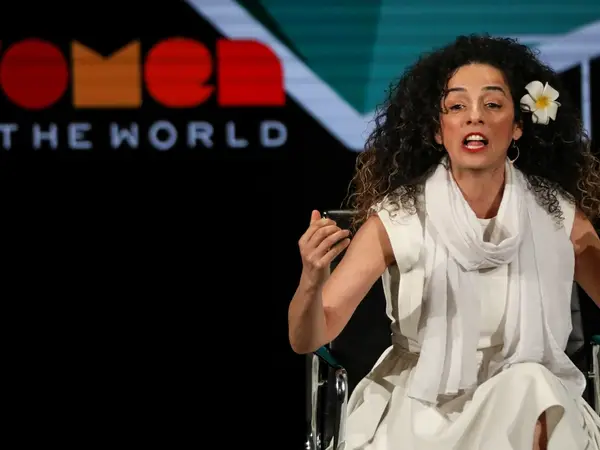A US federal court has ruled that the Islamic Republic regime should pay over $3.3 million in damages to Iranian activist Masih Alinejad for detaining her brother.
The Iranian American journalist and women's rights campaigner released on twitter the court’s decision on Sunday. “In a major step, a US federal court has found the Islamic Republic of Iran guilty of wrongfully arresting my brother Alireza Alinejad and detaining him for two years to pressure me to stop my campaigns against compulsory hijab and gender apartheid.”
“The US District Judge G. Michael Harvey concluded Alireza was kept as a hostage for two years,” she added.
The judge awarded the plaintiff, Masih Alinejad, $1,662,500 in compensatory damages and $1,662,500 in punitive damages, after ruling in favor of her and against the defendant the Islamic Republic of Iran.
Alinejad sued the Iranian government, the Judiciary of Iran, and the Islamic Revolutionary Guard Corps (IRGC) as well as the Supreme Leader Ali Khamenei in 2019 for harassment against her and her family after the arrest of her brother.
She based her case on the Foreign Sovereign Immunities Act (FSIA), and Torture Victim Protection Act of 1991 (TVPA) for severe personal injuries and other irreparable harm suffered as a result of the regime’s “unlawful acts of terrorism, torture, hostage taking, and other torts against Alireza Alinejad-Ghomi (Plaintiff’s brother), and Ms. Zarrin Badpa, (Plaintiff’s mother).
“Alireza Alinejad-Ghomi was taken as a political hostage and continues to be tortured and imprisoned in order to discredit and intimidate Ms. Masih Alinejad and to pressure her to prevent her from speaking out against the Iranian regime,” read a part of the complaint submitted in December 2019.
Earlier in 2019, Alinejad announced that security forces had arrested her brother Alireza and were taking her family in Iran hostage to put pressure on her to cease her anti-regime activities. She also published a video clip in which her brother before his arrest said pressure on her parents had increased and they were being intimidated to condemn her and her activities on the state-run television (IRIB).
Alireza Alinejad was arrested in August 2019 and was later sentenced to eight years in prison. In 2020, his lawyer Saeid Dehghan, said Branch 36 of Tehran Province Appeals Court had confirmed an eight-year sentence for his client. Masih Alinejad announced the conditional release of his brother, writer and editor Alireza Alinejad, from Evin Prison in July 2021.
In her Sunday tweet, she urged all families, especially dual nationals held in detention, to file legal cases against the regime to prevent their loved ones from being used as bargaining chips.
She noted that this case was never about monetary compensation, but her “aim was to turn the spotlight fully on the crimes of the Islamic Republic.”
Many Iranians assuming that the court's judgement will be paid from Iran's frozen assets have raised questions about how fair it would be to pay money that belongs the Iranian nations to an individual or one family for their suffering. But the court's judgment does not specify that the money should come from any frozen assets.
Apparently, more court decisions are needed specifically to order the funds to be released from Iran's frozen assets that are mainly in Luxembourg. That would also require legal procedures in that country.
Other than that, there are no clear mechanisms to actually receive compensation from the Iranian government. It is obvious that it would deny any wrongdoing and condemn such rulings as an “interference in its internal affairs.”
Families of the victims of the 1983 Beirut barracks bombing, in which 307 people: 241 US and 58 French military personnel, six civilians, and two attackers also won court cases.
In their case filed against the Islamic Republic of Iran and the Ministry of Information and Security in 2001, the families of the 241 US peacekeepers sought a judgment that Iran was responsible for the attack and relief in the form of damages. In July 2012, federal Judge Royce Lamberth ordered Iran to pay hundreds of millions of dollars in damages and interest to the families. In April 2016, the US Supreme Court ruled that the regime’s blocked assets could be used, but there are no reports of families having received any money.
Masih Alinejad used the momentum and urged “Washington, and other governments, not to reward the Islamic Republic, which has no regards for human rights and is guilty of transnational repression,” also calling on American citizens to tell US elected officials not to engage with Islamic Republic.
